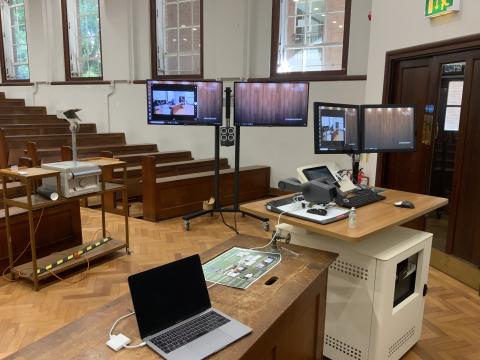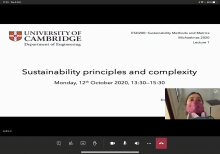Submitted by D.C. Morgan on Thu, 08/04/2021 - 16:30
Below Dick Fenner and Dai Morgan reflect on how the MPhil in Engineering for Sustainable Development has continued to operate and thrive during the pandemic
Just over 12 months ago in March 2020 we had completed the 2019-20 MPhil taught programme and were about to enter the first national lockdown to contain the rapid spread of COVID-19 which was taking off at an alarming rate across the world. This meant speedy adjustments had to be made to the delivery of the MPhil and these have continued in various forms and to varying degrees through subsequent national lockdowns up to now (April 2021). It is testimony to the dedication and commitment of the MPhil course team that the programme has continued to be delivered successfully, and all the educational aims it promises have been met, with some notable highlights along the way.
As with most educational establishments the biggest immediate challenge was to move much of our activity on-line. Whilst it was not possible to run the planned Spring Field Course to Wales due to the imposition of national restrictions on travel, students continued through last summer to work on their individual research Dissertations with extensive support from staff through supervisions using the new medium of Zoom. These worked well and some excellent work was achieved, some of which has subsequently been published in peer reviewed Journals. The Annual Dissertation Conference was extended over a more relaxed 5-day period in July and held on-line, with the additional benefit of enabling Alumni from around the world to join sessions and engage with the research of the current cohort. Most students smoothly completed their course as normal by the end of August.

We then turned to facing the challenges of the new academic year with levels of COVID-19 rising alarmingly again in September. Sadly it was not possible to hold the Autumn Field Course at the beginning of Michaelmas Term but face-to-face teaching did take place for the new group of 28 students, who arrived in October - as usual from all parts of the world. This meant the core programme and associated seminars and discussions took place live in a socially distanced lecture theatre, complete with facemasks, sanitiser and ventilation, with parallel online provision to enable those who had to shield or self-isolate to join the sessions. Other activities and elective modules were delivered on-line and this mix of teaching modes worked well and was well received by the students.
 Whilst these new approaches to course delivery were indeed challenging for both staff and students, we can draw some positives from the new arrangements both in terms of recalibrating and reorganising course content in new and exciting ways, and providing students with additional flexibility in terms of when and how they accessed material.
Whilst these new approaches to course delivery were indeed challenging for both staff and students, we can draw some positives from the new arrangements both in terms of recalibrating and reorganising course content in new and exciting ways, and providing students with additional flexibility in terms of when and how they accessed material.
Our alumni community stepped forward and provided some fascinating contributions through our Practitioner Viewpoint Series of special talks. This began with Francis Heil (2019) who explained his role in developing resilience plans for the UK National Infrastructure Commission, and these sessions were continued by Pravin Karki (2007) who is Head of Global HydroPower at the World Bank. Pravin convened a panel with his colleagues at the World Bank for us, including Feriha Mugisha (2011), and led a discussion on the role of the Bank in development. Professor Simon Spooner (2004) gave a talk for Cambridge University Science Society on “Building a Post-Combustion Society” and issues of dealing with mis-information, fake news and climate change denial stimulated a lively group debate.
Since the New Year we have been back in a UK wide national lockdown, which is slowly beginning to ease. This has meant all teaching in Lent Term has been delivered on-line. Nevertheless a number of highlights stand out including a 2 session contribution from Professor Jay Golden (2003), who since being an early graduate from the MPhil has held senior positions in USA academia, including Duke University. Jay discussed approaches to sustainability systems science and challenged students to respond to real problems relating to the automobile and retail industries. Dr Clara Aranda-Jan (2011) gave a personal insight into her professional experience since the MPhil, including the accessibility of digital services and the importance of understanding context in the design of medical devices, work which takes on new relevance in the context of the pandemic.
The Client Consultancy Projects came to a conclusion this month with this year’s teams working on a diverse range of topics including green bonds, hydrogen distribution, smart grid services, infrastructure report cards and systems approaches in the WASH sector, working with organisations ranging from a start-up to global NGOs and established companies.
In some ways our on-line operation has enabled us to draw on contributions from around the world which we would previously have missed out on, as the speakers and organisations concerned couldn’t be present in Cambridge.
Of course, these changes which we have made have been a test of our flexibility and adaptiveness and have provided a real-life case study to examine some of the key themes of the course with respect to dealing with change and uncertainty. We have all emerged stronger as a result, with new skills and tools at our disposal.
We hope during the next few months we will slowly be returning to normal, and be ready to offer the MPhil programme in a more conventional manner from October 2021. Whatever the future holds we are confident we can welcome our 20th cohort to the programme in the autumn knowing the course can be delivered under circumstances that prevail at the time. We will make sure 2021-22 will be full of memorable celebrations and look forward to the next 20 years for the MPhil in Engineering for Sustainable Development - the challenges the world faces are not diminishing and much needs to be done.
